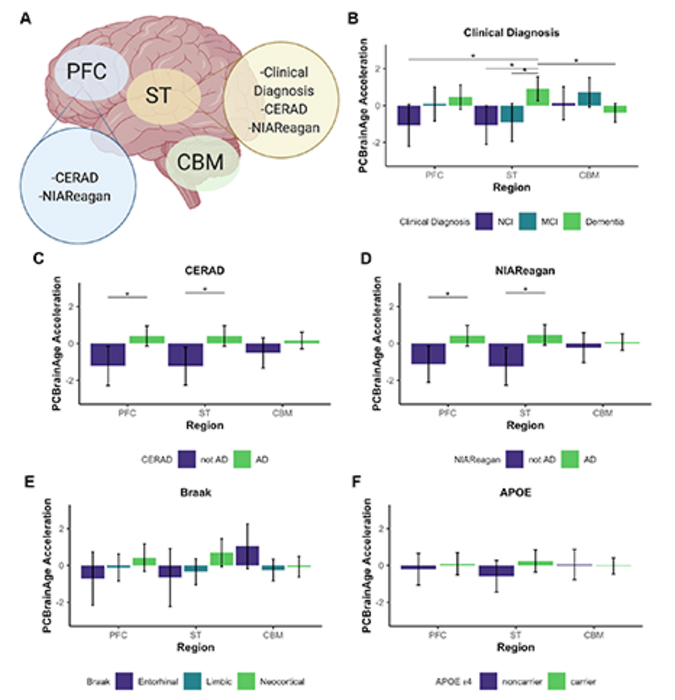BUFFALO, NY- August 1, 2022 – A new research paper was published in Aging (abbreviated as “Aging (Albany NY)” by Medline/PubMed and as “Aging-US” by Web of Science) on the cover of Volume 14, Issue 14, entitled, “Aging the brain: multi-region methylation principal component based clock in the context of Alzheimer’s disease.”

Credit: Thrush et al.
BUFFALO, NY- August 1, 2022 – A new research paper was published in Aging (abbreviated as “Aging (Albany NY)” by Medline/PubMed and as “Aging-US” by Web of Science) on the cover of Volume 14, Issue 14, entitled, “Aging the brain: multi-region methylation principal component based clock in the context of Alzheimer’s disease.”
Alzheimer’s disease (AD) risk increases exponentially with age and is associated with multiple molecular hallmarks of aging, one of which is epigenetic alterations. Epigenetic age predictors based on 5’ cytosine methylation (DNAm), or epigenetic clocks, have previously suggested that epigenetic age acceleration may occur in AD brain tissue.
“Epigenetic clocks are promising tools for the quantification of biological aging, yet we hypothesize that investigation of brain aging in AD will be assisted by the development of brain-specific epigenetic clocks.”
In this new study, researchers Kyra L. Thrush, David A. Bennett, Christopher Gaiteri, Steve Horvath, Christopher H. van Dyck, Albert T. Higgins-Chen, and Morgan E. Levine, from Yale University, Rush University Medical Center, University of California Los Angeles, VA Connecticut Healthcare System, and Altos Labs, hypothesized that a brain age methylation-based predictor could be developed with meaningful disease associations and broad multi-brain-region utility.
“To test this, we used DNAm capture to generate a PC-based epigenetic predictor of brain aging which we show to: (1) strongly reflect AD neuropathology and cognitive decline, and (2) track age across multiple brain regions.”
The team generated a novel age predictor, termed PCBrainAge, that was trained solely in cortical samples. This predictor utilizes a combination of principal components analysis and regularized regression, which reduces technical noise and greatly improves test-retest reliability.
“To characterize the scope of PCBrainAge’s utility, we generated DNAm data from multiple brain regions in a sample from the Religious Orders Study and Rush Memory and Aging Project.”
PCBrainAge captures meaningful heterogeneity of aging: Its acceleration demonstrates stronger associations with clinical AD dementia, pathologic AD, and APOE ε4 carrier status compared to extant epigenetic age predictors. It further does so across multiple cortical and subcortical regions.
“Overall, PCBrainAge’s increased reliability and specificity makes it a particularly promising tool for investigating heterogeneity in brain aging, as well as epigenetic alterations underlying AD risk and resilience.”
DOI: https://doi.org/10.18632/aging.204196
Corresponding Authors: Albert T. Higgins-Chen, Morgan E. Levine
Emails: [email protected], [email protected]
Keywords: epigenetic clocks, unsupervised machine learning, brain, Alzheimer’s disease, age acceleration
Sign up for free Altmetric alerts about this article: https://aging.altmetric.com/details/email_updates?id=10.18632%2Faging.204196
About Aging-US:
Launched in 2009, Aging (Aging-US) publishes papers of general interest and biological significance in all fields of aging research and age-related diseases, including cancer—and now, with a special focus on COVID-19 vulnerability as an age-dependent syndrome. Topics in Aging go beyond traditional gerontology, including, but not limited to, cellular and molecular biology, human age-related diseases, pathology in model organisms, signal transduction pathways (e.g., p53, sirtuins, and PI-3K/AKT/mTOR, among others), and approaches to modulating these signaling pathways.
Please visit our website at Aging-US.com and connect with us:
- SoundCloud – https://soundcloud.com/Aging-Us
- Facebook – https://www.facebook.com/AgingUS/
- Twitter – https://twitter.com/AgingJrnl
- Instagram – https://www.instagram.com/agingjrnl/
- YouTube – https://www.youtube.com/agingus
- LinkedIn – https://www.linkedin.com/company/aging/
- Pinterest – https://www.pinterest.com/AgingUS/
For media inquiries, please contact [email protected].
Aging (Aging-US) Journal Office
6666 E. Quaker Str., Suite 1B
Orchard Park, NY 14127
Phone: 1-800-922-0957, option 1
###
Journal
Aging-US
DOI
10.18632/aging.204196
Method of Research
Experimental study
Subject of Research
Human tissue samples
Article Title
Aging the brain: multi-region methylation principal component based clock in the context of Alzheimer’s disease
Article Publication Date
30-Jul-2022




